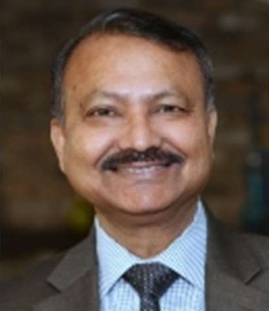IEEE VIC CIS Talk on Cyber Security (IEEE Distinguished Lecture Series)
IEEE VIC CIS Chapter
Professor Dipankar Dasgupta (IEEE Distinguished Speaker) will deliver a talk on Cyber Security. This is a part of the IEEE Victorian Computational Intelligence Society (CIS) series of talks. The online delivery is kindly hosted by IEEE Victorian Section and will take place 12.00 -1.00 pm.
Join Zoom Meeting (14 Oct at 12 pm)
TBA
Meeting ID: TBA
Password: TBA
Date and Time
Location
Hosts
Registration
-
 Add Event to Calendar
Add Event to Calendar
Loading virtual attendance info...
- Contact Event Host
- Co-sponsored by IEEE VIC CIS Chapter; IEEE VIC Section
Speakers
 Prof Dipankar Dasgupta (IEEE Distinguished Speaker) of The University of Memphis, Tennessee, USA
Prof Dipankar Dasgupta (IEEE Distinguished Speaker) of The University of Memphis, Tennessee, USA
Adaptive Multi-Factor Authentication & Cyber Identity
Authentication is a critical part to ensure the identity of a legitimate user. During authentication, an individual’s credential is validated with a specific computational technique to determine the association of the user with his/her claimed identity.
In this talk, I will discuss an adaptive multi-factor authentication (A-MFA) framework which uses adaptive selection of multiple modalities at different operating environment so to make authentication strategy unpredictable to hackers. This methodology incorporates a novel approach of calculating trustworthy values of different authentication factors while the computing device being used under different environmental settings. Accordingly, a subset of authentication factors is determined (at triggering events) on the fly thereby leaving no exploitable a priori pattern or clue for adversaries. Such a methodology of adaptive authentication selection can provide legitimacy to user transactions with an added layer of access protection that is not rely on a fixed set of authentication modalities. Robustness of the system is assured by designing the framework in such a way that if any modality data get compromised, the system can still perform flawlessly using other non-compromised modalities. Scalability can also be achieved by adding new and/or improved modalities with existing set of modalities and integrating the operating/configuration parameters for the added modality.
I will highlight what type of evaluation be required for such identity management software to detect possible deep fakes and other forms of faking biometrics. Other attacks on current means of identity validation may become possible. What would be what good figures of merit to be used as response variables? What are good factors over which we would need to test for next-generation identity eco-systems.
References:
-
Advances in User Authentication. Dipankar Dasgupta, Arunava Roy, Abhijit Nag. Publisher: Springer-Verlag, Inc., August 2017.
-
US Patent # 9,912,657: Adaptive Multi-Factor Authentication, Dasgupta, et al., March 6, 2018.
Biography:
Dr. Dipankar Dasgupta is a professor of Computer Science at the University of Memphis since 1997, an IEEE Fellow, an ACM Distinguished Speaker (2015-2020) and an IEEE Distinguished Lecturer (2022-2024). Dr. Dasgupta is known for his pioneering work on the design and development of intelligent solutions inspired by natural and biological processes. During 1990-2000, he extensively studied different AI/ML techniques and research in the development of an efficient search and optimization method (called structured genetic algorithm) has been applied in engineering design, neural-networks, and control systems. He is one of the founding fathers of
the field of artificial immune systems (a.k.a Immunological Computation) and is at the forefront of applying bio-inspired approaches to cyber defense. His notable works in digital immunity, negative authentication, cloud insurance modeling, dual-filtering and adaptive multi-factor authentication demonstrated the effective use of various AI/ML algorithms. His research accomplishments and achievements have appeared in Computer World Magazine, NASA’s website, and in local TV Channels and Newspapers.
Dr. Dasgupta has authored four books, 5 patents (including 2 under submissions) and have more than 300 research publications (20,000 citations as per google scholar) in book chapters, journals, and international conference proceedings. Among many awards, he was honored with the 2014 ACM-SIGEVO Impact Award for his seminal work on negative authentication, an AI-based approach. He also received five best paper awards in different international conferences and has been organizing IEEE Symposium on Computational Intelligence in Cyber Security at SSCI since 2007. Dr. Dasgupta is an ACM Distinguished Speaker, regularly serves as panelist and keynote speaker and offer tutorials in leading computer science conferences and have given more than 350 invited talks in different universities and industries.
Address:Memphis, Tennessee, United States
To join the meeting please use the zoom details in description. Please do not hesitate to contact the host if you have any queries (Dr Malka N. Halgamuge, malka_nisha@ieee.org).

